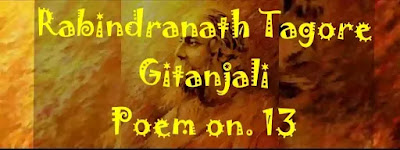Also Read
The song that I came to sing remains unsung to this day.
I have spent my days in stringing and in unstringing my instrument.
The time has not come true, the words have not been rightly set; only there is the agony of wishing in my heart.
The blossom has not opened; only the wind is sighing by.
I have not seen his face, nor have I listened to his voice; only I have heard his gentle footsteps from the road before my house.
The live long day has passed in spreading his seat on the floor; but the lamp has not been lit and I cannot ask him into my house.
I live in the hope of meeting with him; but this meeting is not yet.
Summary
The poet here expresses his aspiration to sing a song and through it to find God. He says that he was born to sing a certain song but it has not been composed yet. He has been tuning and untuning his musical instrument in readiness for the song. But the time is not right yet and the lyrics have not been composed properly either, he is only experiencing the pain of longing in his heart. The song has not matured, not flowered, the flower has not bloomed, only the wind has been passing by. Then the poet says that he has not seen the face of God nor heard His voice but he has heard His gentle footsteps on the road before his house.
The poet has spent the day spreading a mat for his visitor but because he has not been able to light the lamps, he cannot invite Him in. The poet concludes by saying that he lives on only with the hope that one day he may meet God, but that day is far to come.
Critical Analysis
This lyric is divided into two portions that are to be compared in its contrasting but inherently similar thoughts. The poet says that he is born to sing a song but that song is still at its nascent stage and yet unsung. He has spent days labouring in preparation but neither the time was right nor were the words properly set. The flower symbolism is again repeated. His yet unsung song is a flower that has not bloomed yet. Similarly the second section deals with how he has come close to God in hearing his footsteps but he has neither seen his face nor heard His voice. He has made preparations by laying the seat but it is not yet complete. He has not yet lighted the lamp so he cannot invite God in. Yet, he hopes one day to meet God as he hopes one day to sing his song.
Tagore thus beautifully expresses how he longs for a divine union with God but cannot because his preparation was half-complete. Also because of this his realisation of God is vague (he has only heard his footsteps) because he has not yet attained wisdom fully nor gained purity of soul. As the lamp needs to be lighted to worship, he needs to be blessed with enlightenment.
Annotation
Stringing and unstringing: tuning up a stringed musical instrument. The time has not come true: The time is not right yet. The words have not been rightly set: the poet has not been able to compose the words of his song in proper order. The blossom has not opened: the song in the poet's mind has not developed fully as yet. Spreading his seat: the mat set on the floor for the guest. The lamp has not been lit: the poet has not been blessed with the light of enlightenment.
